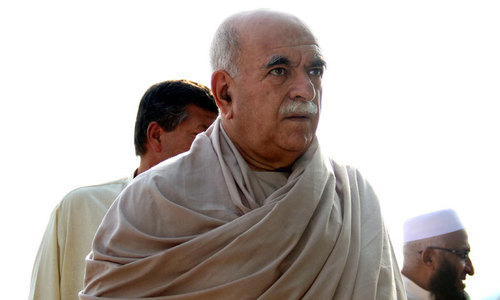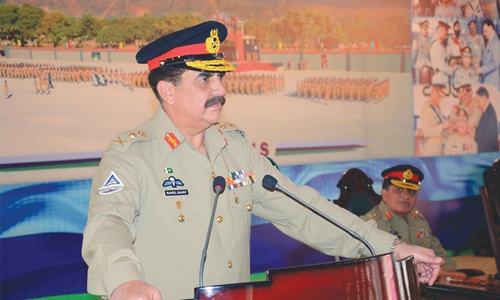ISLAMABAD: As the military launched its first combing operations in Punjab targeting the banned Tehreek-i-Taliban Pakistan’s splinter group Jamaatul Ahrar, Chief of Army Staff Gen Raheel Sharif publicly vented frustration on Friday over the government’s poor progress on the National Action Plan against terrorism. He said the military’s gains during Operation Zarb-i-Azb were being lost.
“The National Action Plan is central to achievements of our objectives and its lack of progress is affecting the consolidation phase of Operation Zarb-i-Azb,” he said at a special security meeting at the General Headquarters. The meeting was attended by Inter-Services Intelligence Director General Lt Gen Rizwan Akhtar, 10 Corps Commander Lt Gen Malik Zafar Iqbal and principal staff officers.
The army chief’s blunt criticism, which came a day after civilian and military leaders held two-day deliberations on NAP’s sluggish performance, reflected the disappointment within the armed forces over the government’s response to their reservations over the plan’s implementation.
Combing operations launched in Rawalpindi district
The military’s dissatisfaction with the government’s performance in combating terrorism and extremism is no secret, but it is the second time that the army chief has publicly expressed his discontentment over the state of affairs since NAP was initiated in December 2014. The last time he did so was at a corps commanders conference in November last year, where he reminded the government of the need for “matching governance initiatives” and cautioned that without them the effects of the military’s ‘kinetic operations’ could be undermined.
His remarks had riled the political leadership and both the government and opposition angrily reacted.
The message this time was no different.
“Unless all prongs deliver meaningfully and all inadequacies are addressed, remnants of terrorism would continue to simmer and long-term peace and stability would remain a distant dream,” the general warned.
The military’s concerns, according to an insider, relate to uncertain future of the Protection of Pakistan Act under which special courts had been established, a major counterterrorism legislation that expired last month; the political leadership’s reluctance to allow special powers for Rangers in both Punjab and Sindh; issues concerning preventive detention of suspects for inquiry; poor prosecution of cases of terrorism; lack of progress on Fata (Federally Administered Tribal Areas) and madressah (seminary) reforms; problems with raising of new Frontier Corps wings in Balochistan and Khyber Pakhtunkhwa; lack of focus on capacity building of civilian law enforcement agencies; and allocation of required funds for countering terrorism.
The army chief briefed the meeting about the discussions he had held with the civilian leaders during the two-day-long review session.
The upshot of the civil-military deliberations was a decision to set up a task force for overseeing the implementation of NAP. But the military seems dissatisfied with the decision because of an unclear hierarchy and timeline for action by the new body.
“Time is of the essence. We cannot afford to wait,” an officer aware of the sense in the military said.
The military has further been upset over critical comments by some politicians after the recent Quetta bomb attack and an unending controversy over the future of the army chief, who is set to retire in November.
“Any distracting and inciting comments and theories by some quarters are unhelpful and undermining the overall national effort,” Gen Sharif told the generals.
The resentment within the military’s top brass over the criticism by politicians, particularly by the Pakhtunkhwa Milli Awami Party’s chief Mehmood Khan Achakzai and the Jamiat Ulema-i-Islam-Fazl’s leader Maulana Mohammad Khan Sherani, was forcefully conveyed to the government during the review meeting. The government then defended the performance of the military and intelligence agencies in the National Assembly and this was also included in a statement issued by the Prime Minister Office at the conclusion of the NAP meeting.
But that seemingly has not been enough to pacify the military, which believes that it is being unjustly criticised.
Combing operations
The military, meanwhile, for the first time started combing operations in Punjab by raiding terrorist hideouts in Rawalpindi district’s Kallar Sayedan and Gujar Khan areas.
The TTP’s splinter group Jamaatul Ahrar, which has been behind some of the most gruesome attacks in the country and claimed this week’s Quetta bombing, was targeted in the raids.
According to the ISPR, the military’s public relations wing, six terrorists, including two ‘important militant commanders’, were held and a cache of arms and ammunition, including prepared improvised explosive devices, seized.
The countrywide combing operations, involving large-scale troop deployment, were approved by the military in May after the completion of kinetic operations in North Waziristan.
The new operations are aimed at busting terrorist sleeper cells and eliminating hiding terrorists.
The Punjab government has, however, apparently remained averse to special military-led operations in the province. In that respect the start of the operations in Punjab are being seen as significant by analysts.
Gen Sharif had ordered at a corps commanders meeting this week intensification of the combing operations by expanding their scope and spread. Troops were allowed to go after the terrorists everywhere in the country.
Published in Dawn, August 13th, 2016













































